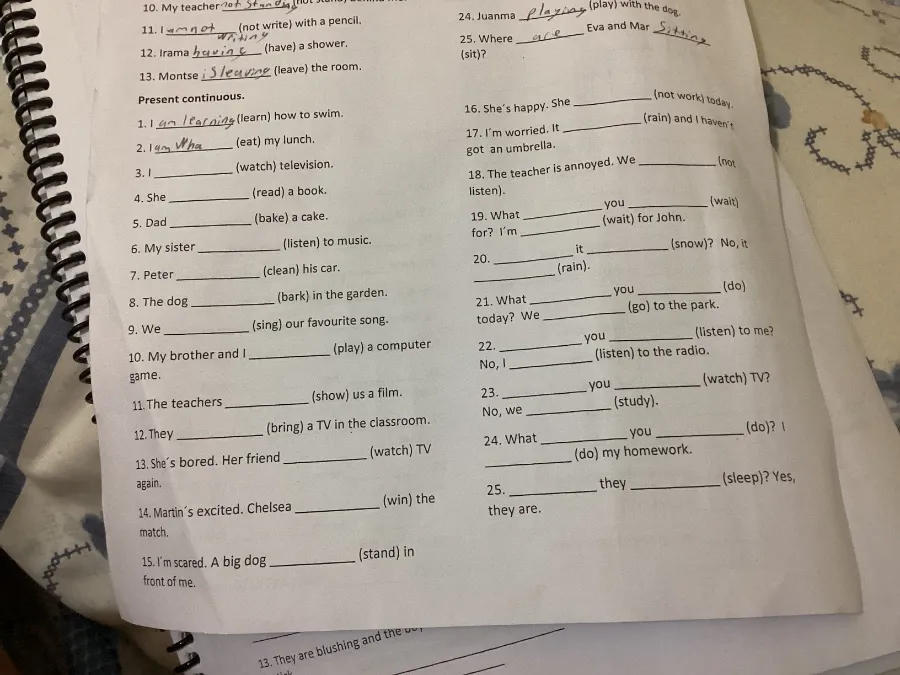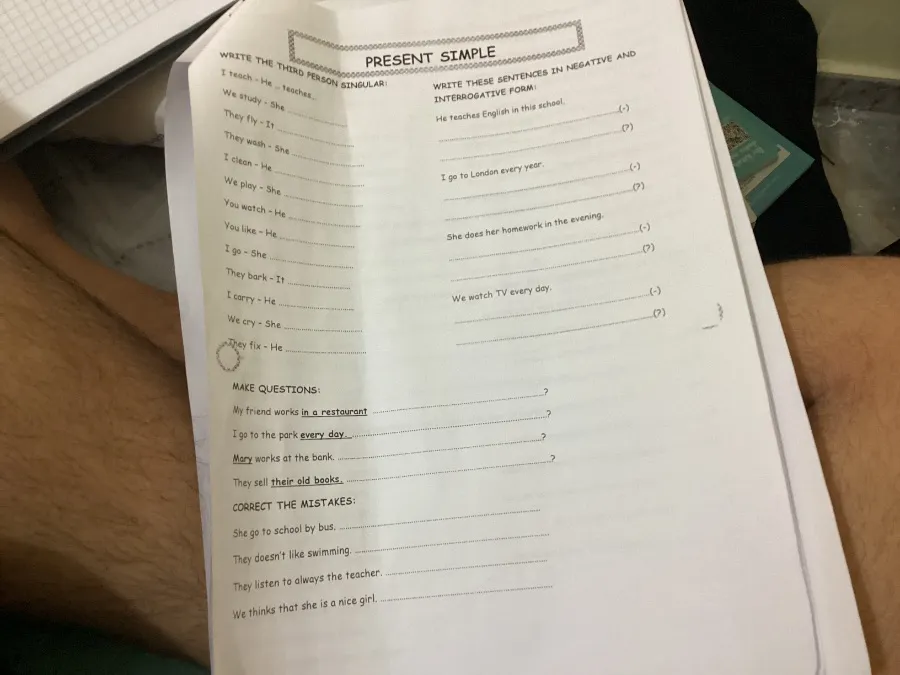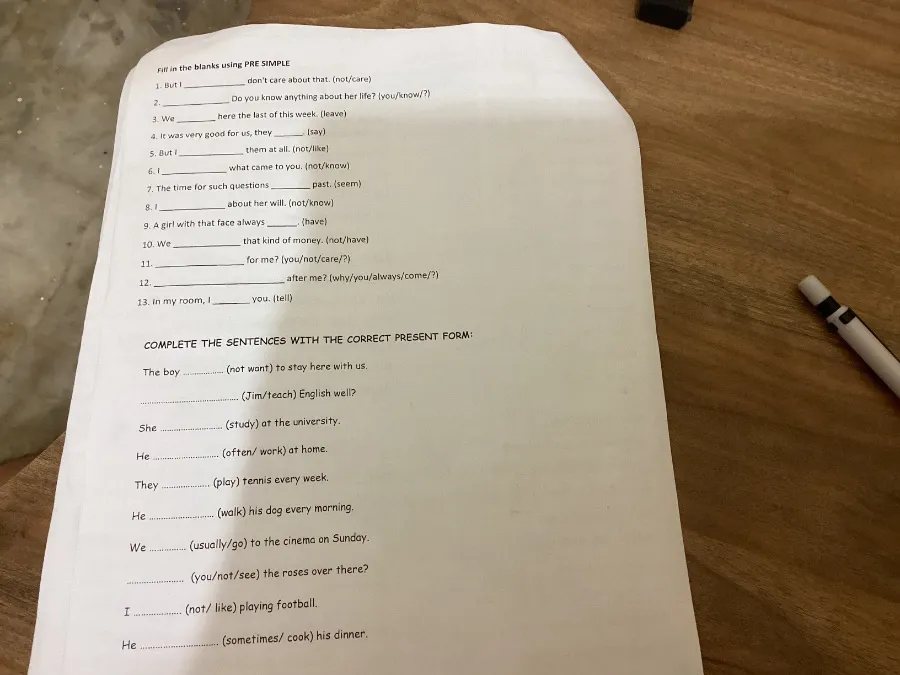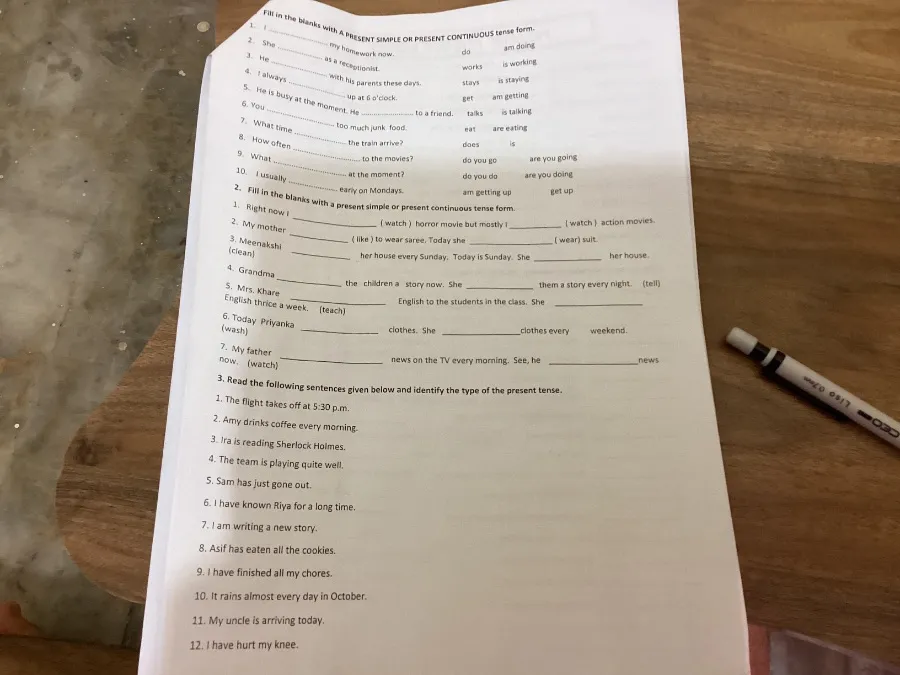Present Continuous Tense Exercises

Elbette, tüm görevleri sırayla ve ayrıntılı açıklamalarla çözelim.
Görev 1
- I am learning (learn) how to swim.
Açıklama: "Şu an" anlamını vurgulamak için şimdiki zaman sürekli kullanılır. "I" öznesiyle "am" yardımcı fiili ve fiilin "-ing" eki almış hali kullanılır.
Görev 2
- I am eating (eat) my lunch.
Açıklama: Şu anda yapılan bir eylemi ifade etmek için şimdiki zaman sürekli kullanılır. "I" öznesiyle "am" yardımcı fiili ve fiilin "-ing" eki almış hali kullanılır.
Görev 3
- I am watching (watch) television.
Açıklama: Şu anda yapılan bir eylemi ifade etmek için şimdiki zaman sürekli kullanılır. "I" öznesiyle "am" yardımcı fiili ve fiilin "-ing" eki almış hali kullanılır.
Görev 4
- She is reading (read) a book.
Açıklama: Şu anda yapılan bir eylemi ifade etmek için şimdiki zaman sürekli kullanılır. "She" öznesiyle "is" yardımcı fiili ve fiilin "-ing" eki almış hali kullanılır.
Görev 5
- Dad is baking (bake) a cake.
Açıklama: Şu anda yapılan bir eylemi ifade etmek için şimdiki zaman sürekli kullanılır. "Dad" öznesiyle "is" yardımcı fiili ve fiilin "-ing" eki almış hali kullanılır.
Görev 6
- My sister is listening (listen) to music.
Açıklama: Şu anda yapılan bir eylemi ifade etmek için şimdiki zaman sürekli kullanılır. "My sister" öznesiyle "is" yardımcı fiili ve fiilin "-ing" eki almış hali kullanılır.
Görev 7
- Peter is cleaning (clean) his car.
Açıklama: Şu anda yapılan bir eylemi ifade etmek için şimdiki zaman sürekli kullanılır. "Peter" öznesiyle "is" yardımcı fiili ve fiilin "-ing" eki almış hali kullanılır.
Görev 8
- The dog is barking (bark) in the garden.
Açıklama: Şu anda yapılan bir eylemi ifade etmek için şimdiki zaman sürekli kullanılır. "The dog" öznesiyle "is" yardımcı fiili ve fiilin "-ing" eki almış hali kullanılır.
Görev 9
- We are singing (sing) our favourite song.
Açıklama: Şu anda yapılan bir eylemi ifade etmek için şimdiki zaman sürekli kullanılır. "We" öznesiyle "are" yardımcı fiili ve fiilin "-ing" eki almış hali kullanılır.
Görev 10
- My brother and I are playing (play) a computer game.
Açıklama: Şu anda yapılan bir eylemi ifade etmek için şimdiki zaman sürekli kullanılır. "My brother and I" öznesiyle "are" yardımcı fiili ve fiilin "-ing" eki almış hali kullanılır.
Elbette, tüm görevleri sırayla ve ayrıntılı açıklamalarla çözelim.
Görev 11
- The teachers are showing (show) us a film.
Açıklama: Şu anda yapılan bir eylemi ifade etmek için şimdiki zaman sürekli kullanılır. "The teachers" öznesiyle "are" yardımcı fiili ve fiilin "-ing" eki almış hali kullanılır.
Görev 12
- They are bringing (bring) a TV in the classroom.
Açıklama: Şu anda yapılan bir eylemi ifade etmek için şimdiki zaman sürekli kullanılır. "They" öznesiyle "are" yardımcı fiili ve fiilin "-ing" eki almış hali kullanılır.
Görev 13
- She's bored. Her friend is watching (watch) TV again.
Açıklama: Şu anda yapılan bir eylemi ifade etmek için şimdiki zaman sürekli kullanılır. "Her friend" öznesiyle "is" yardımcı fiili ve fiilin "-ing" eki almış hali kullanılır.
Görev 14
- Martin's excited. Chelsea is winning (win) the match.
Açıklama: Şu anda yapılan bir eylemi ifade etmek için şimdiki zaman sürekli kullanılır. "Chelsea" öznesiyle "is" yardımcı fiili ve fiilin "-ing" eki almış hali kullanılır.
Görev 15
- I'm scared. A big dog is standing (stand) in front of me.
Açıklama: Şu anda yapılan bir eylemi ifade etmek için şimdiki zaman sürekli kullanılır. "A big dog" öznesiyle "is" yardımcı fiili ve fiilin "-ing" eki almış hali kullanılır.
Görev 16
- She's happy. She is not working (not work) today.
Açıklama: Şu anda yapılmayan bir eylemi ifade etmek için şimdiki zaman sürekli kullanılır. "She" öznesiyle "is" yardımcı fiili, "not" olumsuzluk eki ve fiilin "-ing" eki almış hali kullanılır.
Görev 17
- I'm worried. It is raining (rain) and I haven't got an umbrella.
Açıklama: Şu anda olan bir durumu ifade etmek için şimdiki zaman sürekli kullanılır. "It" öznesiyle "is" yardımcı fiili ve fiilin "-ing" eki almış hali kullanılır.
Görev 18
- The teacher is annoyed. We are not listening (not listen).
Açıklama: Şu anda yapılmayan bir eylemi ifade etmek için şimdiki zaman sürekli kullanılır. "We" öznesiyle "are" yardımcı fiili, "not" olumsuzluk eki ve fiilin "-ing" eki almış hali kullanılır.
Görev 19
- What are you waiting (wait) for? I'm waiting for John.
Açıklama: Şu anda yapılan bir eylemi sormak için şimdiki zaman sürekli kullanılır. "You" öznesiyle "are" yardımcı fiili ve fiilin "-ing" eki almış hali kullanılır.
Görev 20
- Is it snowing (snow)? No, it is raining (rain).
Açıklama: Şu anda olan bir durumu sormak ve ifade etmek için şimdiki zaman sürekli kullanılır. "It" öznesiyle "is" yardımcı fiili ve fiilin "-ing" eki almış hali kullanılır.
Elbette, tüm görevleri sırayla ve ayrıntılı açıklamalarla çözelim.
Görev 21
- What are you doing (do) today? We are going (go) to the park.
Açıklama: Şu anda yapılan bir eylemi sormak ve ifade etmek için şimdiki zaman sürekli kullanılır. "You" öznesiyle "are" yardımcı fiili ve fiilin "-ing" eki almış hali kullanılır. "We" öznesiyle "are" yardımcı fiili ve fiilin "-ing" eki almış hali kullanılır.
Görev 22
- Are you listening (listen) to me? No, I am listening (listen) to the radio.
Açıklama: Şu anda yapılan bir eylemi sormak ve ifade etmek için şimdiki zaman sürekli kullanılır. "You" öznesiyle "are" yardımcı fiili ve fiilin "-ing" eki almış hali kullanılır. "I" öznesiyle "am" yardımcı fiili ve fiilin "-ing" eki almış hali kullanılır.
Görev 23
- Are you watching (watch) TV? No, we are studying (study).
Açıklama: Şu anda yapılan bir eylemi sormak ve ifade etmek için şimdiki zaman sürekli kullanılır. "You" öznesiyle "are" yardımcı fiili ve fiilin "-ing" eki almış hali kullanılır. "We" öznesiyle "are" yardımcı fiili ve fiilin "-ing" eki almış hali kullanılır.
Görev 24
- What are you doing (do)? I am doing (do) my homework.
Açıklama: Şu anda yapılan bir eylemi sormak ve ifade etmek için şimdiki zaman sürekli kullanılır. "You" öznesiyle "are" yardımcı fiili ve fiilin "-ing" eki almış hali kullanılır. "I" öznesiyle "am" yardımcı fiili ve fiilin "-ing" eki almış hali kullanılır.
Görev 25
- Are they sleeping (sleep)? Yes, they are.
Açıklama: Şu anda yapılan bir eylemi sormak için şimdiki zaman sürekli kullanılır. "They" öznesiyle "are" yardımcı fiili ve fiilin "-ing" eki almış hali kullanılır.

Elbette, tüm görevleri tek seferde ve ayrıntılı açıklamalarla çözelim. İki farklı bölüm var: Present Continuous (Şimdiki Zaman Sürekli) ve Present Simple (Geniş Zaman). Önce Present Continuous bölümünü tamamlayalım, sonra Present Simple bölümüne geçelim.
Present Continuous Bölümü Zaten Tamamlandı
İlk mesajlarınızda Present Continuous bölümündeki tüm görevleri (1-25) zaten çözdük. Şimdi Present Simple bölümüne geçelim.
Present Simple (Geniş Zaman) Bölümü
Bu bölümde aşağıdaki görevler bulunmaktadır:
- Write the third person singular: Üçüncü tekil şahıslara göre fiilleri yazın.
- Write these sentences in negative and interrogative form: Bu cümleleri olumsuz ve soru şeklinde yazın.
- Make questions: Sorular oluşturun.
- Correct the mistakes: Hataları düzeltin.
Görev 1: Write the third person singular
Bu görevde, verilen fiilleri üçüncü tekil şahıslara (he, she, it) göre çekimlememiz gerekiyor. Geniş zamanda üçüncü tekil şahıslarda fiillere genellikle "-s", "-es" veya "-ies" eklenir.
- I teach - He teaches
- We study - She studies (y harfi düşer ve ies gelir)
- They fly - It flies (y harfi düşer ve ies gelir)
- They wash - She washes (sh ile bittiği için es gelir)
- I clean - He cleans
- We play - She plays
- You watch - He watches (ch ile bittiği için es gelir)
- You like - He likes
- I go - She goes (o ile bittiği için es gelir)
- They bark - It barks
- I carry - He carries (y harfi düşer ve ies gelir)
- We cry - She cries (y harfi düşer ve ies gelir)
- They fix - He fixes (x ile bittiği için es gelir)
Görev 2: Write these sentences in negative and interrogative form
Bu görevde, verilen cümleleri olumsuz ve soru cümlelerine dönüştürmemiz gerekiyor.
- He teaches English in this school.
- Negative: He does not teach English in this school.
- Interrogative: Does he teach English in this school?
- I go to London every year.
- Negative: I do not go to London every year.
- Interrogative: Do you go to London every year?
- She does her homework in the evening.
- Negative: She does not do her homework in the evening.
- Interrogative: Does she do her homework in the evening?
- We watch TV every day.
- Negative: We do not watch TV every day.
- Interrogative: Do you watch TV every day?
Görev 3: Make questions
Bu görevde, verilen cümlelere uygun sorular oluşturmamız gerekiyor.
- My friend works in a restaurant.
- Where does your friend work?
- I go to the park every day.
- Where do you go every day?
- Mary works at the bank.
- Where does Mary work?
- They sell their old books.
- What do they sell?
Görev 4: Correct the mistakes
Bu görevde, verilen cümlelerdeki hataları düzeltmemiz gerekiyor.
- She go to school by bus.
- Corrected: She goes to school by bus. (Üçüncü tekil şahıs olduğu için fiile -es eki gelir)
- They doesn't like swimming.
- Corrected: They don't like swimming. (They çoğul olduğu için doesn't yerine don't kullanılır)
- They listen to always the teacher.
- Corrected: They always listen to the teacher. (Always zarfı, listen to fiilinden önce gelir)
- We thinks that she is a nice girl.
- Corrected: We think that she is a nice girl. (We çoğul olduğu için fiile ek gelmez)

Elbette, tüm görevleri tek seferde ve ayrıntılı açıklamalarla çözelim. Görüntülerdeki tüm görevleri sırayla tamamlayalım.
Present Simple (Geniş Zaman) Bölümü (İlk Görüntü)
Görev 1: Write the third person singular
- I teach - He teaches
- We study - She studies
- They fly - It flies
- They wash - She washes
- I clean - He cleans
- We play - She plays
- You watch - He watches
- You like - He likes
- I go - She goes
- They bark - It barks
- I carry - He carries
- We cry - She cries
- They fix - He fixes
Görev 2: Write these sentences in negative and interrogative form
- He teaches English in this school.
- Negative: He doesn't teach English in this school.
- Interrogative: Does he teach English in this school?
- I go to London every year.
- Negative: I don't go to London every year.
- Interrogative: Do you go to London every year?
- She does her homework in the evening.
- Negative: She doesn't do her homework in the evening.
- Interrogative: Does she do her homework in the evening?
- We watch TV every day.
- Negative: We don't watch TV every day.
- Interrogative: Do you watch TV every day?
Görev 3: Make questions
- My friend works in a restaurant.
- Where does your friend work?
- I go to the park every day.
- Where do you go every day?
- Mary works at the bank.
- Where does Mary work?
- They sell their old books.
- What do they sell?
Görev 4: Correct the mistakes
- She go to school by bus.
- Corrected: She goes to school by bus.
- They doesn't like swimming.
- Corrected: They don't like swimming.
- They listen to always the teacher.
- Corrected: They always listen to the teacher.
- We thinks that she is a nice girl.
- Corrected: We think that she is a nice girl.
Present Simple (Geniş Zaman) Bölümü (İkinci Görüntü)
Görev 5: Fill in the blanks using PRE SIMPLE
- But I don't care about that. (not/care)
- Do you know anything about her life? (you/know/?)
- We leave here the last of this week. (leave)
- It was very good for us, they pay. (pay)
- But I don't like them at all. (not/like)
- I know what came to you. (not/know)
- The time for such questions seems past. (seem)
- I know about her will. (not/know)
- A girl with that face always has (have)
- We don't have that kind of money. (not/have)
- Do you like for me? (you/not/care/?)
- Why do you come after me? (why/you/always/come/?)
- In my room, I tell you. (tell)
Görev 6: COMPLETE THE SENTENCES WITH THE CORRECT PRESENT FORM:
- The boy doesn't want (not want) to stay here with us.
- Does Jim teach (Jim/teach) English well?
- She studies (study) at the university.
- He often works (often/ work) at home.
- They play (play) tennis every week.
- He walks (walk) his dog every morning.
- We usually go (usually/ go) to the cinema on Sunday.
- Do you see (you/not/see) the roses over there?
- I don't like (not/ like) playing football.
- He sometimes cooks (sometimes/ cook) his dinner.

Elbette, tüm görevleri doğru şekilde inceleyerek tek seferde yapalım. Üçüncü bir görüntü eklediğiniz için, o görüntüdeki görevleri de dahil edeceğim.
Present Simple (Geniş Zaman) Bölümü (İlk Görüntü - Tekrar)
Görev 1: Write the third person singular
- I teach - He teaches
- We study - She studies
- They fly - It flies
- They wash - She washes
- I clean - He cleans
- We play - She plays
- You watch - He watches
- You like - He likes
- I go - She goes
- They bark - It barks
- I carry - He carries
- We cry - She cries
- They fix - He fixes
Görev 2: Write these sentences in negative and interrogative form
- He teaches English in this school.
- Negative: He doesn't teach English in this school.
- Interrogative: Does he teach English in this school?
- I go to London every year.
- Negative: I don't go to London every year.
- Interrogative: Do you go to London every year?
- She does her homework in the evening.
- Negative: She doesn't do her homework in the evening.
- Interrogative: Does she do her homework in the evening?
- We watch TV every day.
- Negative: We don't watch TV every day.
- Interrogative: Do you watch TV every day?
Görev 3: Make questions
- My friend works in a restaurant.
- Where does your friend work?
- I go to the park every day.
- Where do you go every day?
- Mary works at the bank.
- Where does Mary work?
- They sell their old books.
- What do they sell?
Görev 4: Correct the mistakes
- She go to school by bus.
- Corrected: She goes to school by bus.
- They doesn't like swimming.
- Corrected: They don't like swimming.
- They listen to always the teacher.
- Corrected: They always listen to the teacher.
- We thinks that she is a nice girl.
- Corrected: We think that she is a nice girl.
Present Simple (Geniş Zaman) Bölümü (İkinci Görüntü - Tekrar)
Görev 5: Fill in the blanks using PRE SIMPLE
- But I don't care about that. (not/care)
- Do you know anything about her life? (you/know/?)
- We leave here the last of this week. (leave)
- It was very good for us, they pay. (pay)
- But I don't like them at all. (not/like)
- I know what came to you. (not/know)
- The time for such questions seems past. (seem)
- I know about her will. (not/know)
- A girl with that face always has (have)
- We don't have that kind of money. (not/have)
- Do you care for me? (you/not/care/?)
- Why do you always come after me? (why/you/always/come/?)
- In my room, I tell you. (tell)
Görev 6: COMPLETE THE SENTENCES WITH THE CORRECT PRESENT FORM:
- The boy doesn't want (not want) to stay here with us.
- Does Jim teach (Jim/teach) English well?
- She studies (study) at the university.
- He often works (often/ work) at home.
- They play (play) tennis every week.
- He walks (walk) his dog every morning.
- We usually go (usually/ go) to the cinema on Sunday.
- Do you see (you/not/see) the roses over there?
- I don't like (not/ like) playing football.
- He sometimes cooks (sometimes/ cook) his dinner.
Present Simple ve Present Continuous Bölümü (Üçüncü Görüntü)
Görev 7: Fill in the blanks with a PRESENT SIMPLE or PRESENT CONTINUOUS tense form.
- She is doing (do) her homework now.
- He works (work) as a receptionist.
- I always stay (stay) with his parents these days.
- She is getting (get) up at 6 o'clock.
- You talk (talk) to a friend.
- What time does the train arrive?
- How often do you go to the movies?
- What is happening (happen) at the moment?
- I usually get (get) up early on Mondays.
- They are eating (eat) too much junk food.
Görev 8: Fill in the blanks with a present simple or present continuous tense form.
- Right now I am watching (watch) action movies.
- My mother likes (like) to wear saree. Today she is wearing (wear) suit.
- Meenakshi cleans (clean) her house every Sunday. Today is Sunday. She is cleaning (clean) her house.
- Grandma tells (tell) the children a story now. She tells (tell) them a story every night.
- Mrs. Khare teaches (teach) English thrice a week. She teaches (teach) English to the students in the class.
- Today Priyanka is washing (wash) clothes. She washes (wash) clothes every weekend.
- My father is watching (watch) news on the TV every morning. See, he is watching (watch) news now.
Görev 9: Read the following sentences given below and identify the type of the present tense.
- The flight takes off at 5:30 p.m. - Present Simple (Geniş Zaman)
- Amy drinks coffee every morning. - Present Simple (Geniş Zaman)
- Ira is reading Sherlock Holmes. - Present Continuous (Şimdiki Zaman Sürekli)
- The team is playing quite well. - Present Continuous (Şimdiki Zaman Sürekli)
- Sam has just gone out. - Present Perfect (Şimdiki Mükemmel Zaman - not requested, but identified)
- I have known Riya for a long time. - Present Perfect (Şimdiki Mükemmel Zaman - not requested, but identified)
- I am writing a new story. - Present Continuous (Şimdiki Zaman Sürekli)
- Asif has eaten all the cookies. - Present Perfect (Şimdiki Mükemmel Zaman - not requested, but identified)
- I have finished all my chores. - Present Perfect (Şimdiki Mükemmel Zaman - not requested, but identified)
- It rains almost every day in October. - Present Simple (Geniş Zaman)
- My uncle is arriving today. - Present Continuous (Şimdiki Zaman Sürekli)
- I have hurt my knee. - Present Perfect (Şimdiki Mükemmel Zaman - not requested, but identified)





